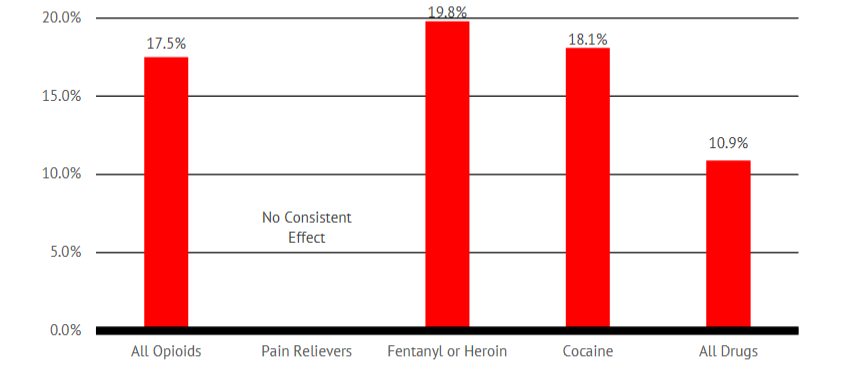Rx Drug Monitoring Programs Are Making Overdose Crisis Worse
/By Pat Anson, PNN Editor
Prescription drug monitoring programs (PDMPs) have long been touted as a key weapon in the war on drugs. With the recent addition of Missouri, all 50 U.S. states now have PDMPs, allowing physicians and pharmacists to consult a database to see if patients might be abusing opioid medication or other controlled substances. Law enforcement agencies also use the databases to see if doctors are “overprescribing” opioids.
But a new study by the Reason Foundation, a libertarian think tank, has found that PDMP’s may be making the opioid crisis worse by forcing patients to turn to street drugs. A record 93,331 Americans died of drug overdoses in 2020, with the vast majority of deaths linked to illicit fentanyl, not prescription opioids.
“This study’s analysis finds that the outcomes of PDMP implementation are far less beneficial than the popular support for this policy suggests,” the report found. “Black market overdoses from heroin and fentanyl dramatically increase following PDMP adoption. It appears that surges in illicit opioid overdose deaths follow PDMP implementation, with no clear reduction in deaths, which is the stated intent of the intervention.”
Co-authors Jacob James Rich and Robert Capodilupo found that states reduced their opioid prescribing rates by an average of 7.7% after implementing a PDMP. But reduced prescribing had “no consistent effect” on overdose deaths. Instead, the study found strong evidence that PDMPs actually caused opioid death rates to increase by 17.5 percent. Fentanyl, heroin and cocaine overdoses all rose sharply.
“As PDMPs enable doctors to identify patients who may be doctor shopping to acquire opioids for non-medical use, doctors will likely stop prescribing opioids to them. Yet these are the very patients who are likely addicted and who will turn to illicit providers to fuel their habits,” the study found.
Percent Increase In Overdose Rates After PDMP Adoption
SOURCE: REASON FOUNDATION
‘Like Playing Russian Roulette’
A recent PNN survey of over 3,600 pain patients found that it was common for patients to be taken off opioids or tapered to lower doses against their wishes. A small minority of patients – about nine percent -- said they turned to illegal drugs as an alternative to opioid medication.
“Tapering long term higher dose patients is a barbaric practice that causes suffering so great that going to the black market for relief is the only option besides ending one’s life,” one patient told us. “People want to live so they will turn to the streets where they encounter counterfeit pills and/or much cheaper heroin, made with fentanyl. They aren't wanting to die. They are trying to live again.”
“I've had to seek medication from the black market & risk arrest & death just to be able to walk & leave my bed,” another patient wrote. “Perhaps I too will end up dead one day from street pills made from illicit fentanyl since I can't obtain access to a safe supply from a trusted manufacturer.”
“I'm not a criminal by nature, and I know that it's illegal to buy drugs off the street, but when pain gets so bad I can actually feel the desperation take over and seek relief wherever I can find it,” said another patent. “If it gets too bad I do sometimes have to find that guy on the street and purchase a 100mg morphine, or something, and just hope that it's not containing a lethal dose of fentanyl or something else. It's kinda like playing Russian roulette.”
“I couldn't stand the pain level anymore. After 3 years suffering so bad, I tried the streets. Found illegal fentanyl. The dealer said it was heroin but I found out what it really was because I overdosed and almost died,” said another pain sufferer. “I learned my lesson! Never again.”
The Reason Foundation estimates that it costs about $500,000 annually for each state to operate a PDMP. While that’s relatively inexpensive, the report said it was “counterproductive” to spend any money on a program that may actually contribute to more deaths. It recommends that states scrap their PDMPs and spend the money on addiction treatment.
“Millions of taxpayer dollars are spent nationwide on the administration of these ineffective programs each year,” the report found. “After terminating all PDMP policies, the revenue spent currently on prescribing interventions should be reappropriated to subsidizing opioids for proven treatments like medication-assisted treatment (MAT) with drugs like buprenorphine and methadone, and allowing Medicaid to cover addiction treatment services.”
Previous studies have also concluded that PDMPs may be causing more harm than good. A 2018 study found that PDMPs were driving some patients to the black market for cheap drugs like heroin. A 2019 study reached the same conclusion, saying there was a “consistent, positive, and significant association” between PDMPs and heroin overdoses.
PDMP’s are also associated with abrupt opioid discontinuation, according to a recent study in the American Journal of Preventive Medicine. Patients on long-term opioid therapy living in states with robust PDMPs were more likely to have their doses cut without tapering.




